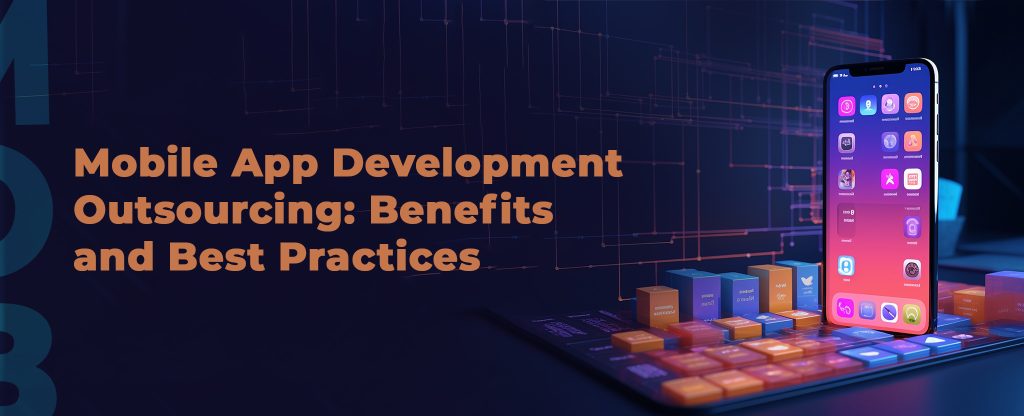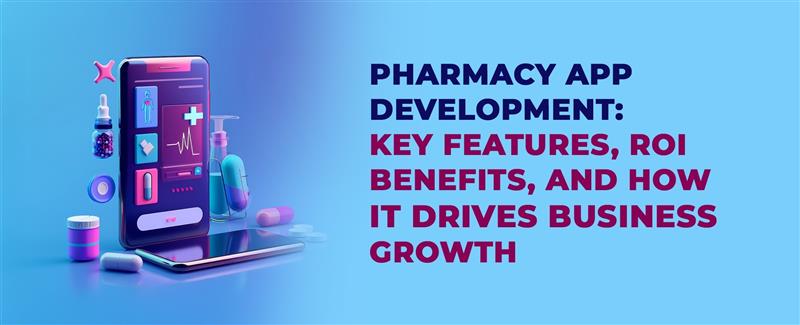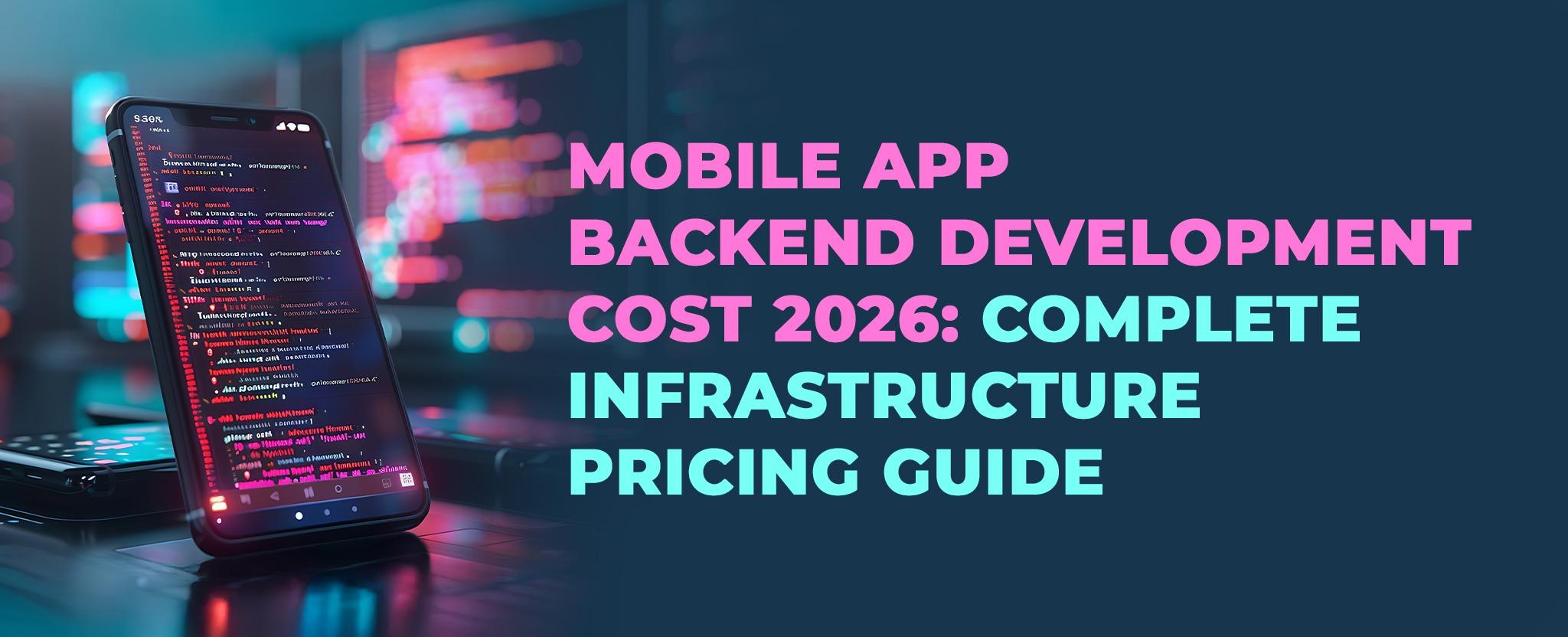Mobile App Development Outsourcing: Benefits and Best Practices
14 Nov 24 


As the ‘Application Outsourcing’ segment of the IT services market is set to hit $124.07 billion by 2029, it’s evident that companies are seeing the worth of smart app creation. Outsourcing app development has become a key move for businesses aiming to stay ahead and innovative.
This shift shows a growing trust in outside know-how to smooth out processes and boost product quality.
Yet, picking the right offshore partner for mobile app development is vital; a poor choice can turn a potential helper into a big problem.
Before we look at the best ways to find a good mobile app development company, let’s first check out why outsourcing app development is beneficial.
Why Outsource Mobile App Development?
By teaming up with expert developers, companies can improve their methods and focus on what they do best. This teamwork frees up in-house resources and brings in skilled experts in new tech. For many firms, outsourcing mobile app creation has become a smart way to get the right skills without building an in-house team.
Here are more key perks of outsourcing app developers, showing how it can boost output, spark new ideas, and help businesses succeed:
Fits Your Budget
Cutting costs or managing expenses better is a main reason why companies that can’t do it themselves or find in-house development too pricey choose outsourcing. It lets these firms pay only for what they need without spending huge sums on wages, worker benefits, office space, and more.
Instead, outsourcing app development to a team in places like India or Ukraine can lower the expected budget by 30 to 40% without hurting the quality of the mobile app.
Proven workflows and processes
Having worked on many projects across different fields, outsourcing companies have had the chance to fine-tune their methods and systems over time. This experience leads to more efficient and effective development, making sure projects finish on time and within budget.
Flexibility and scalability
Businesses sometimes have slow periods, but in-house teams still need pay. Outsourcing gives companies the freedom to not only reduce the outsourced team size but also change working hours, letting them use developers only when actual work is needed. This approach ensures cost-efficiency by paying only for the hours you use.
Conversely, when a mobile app needs a quick release, companies can expand their team and bring in workers from different time zones. This ensures non-stop work, with someone always on the job, no matter the hour. By using this outsourcing benefit, businesses can boost productivity and meet tight deadlines effectively.
Access to Global Developers
Outsourcing app development lets you find the right skills at the right price from around the world. Plus, having a spread-out team keeps development going 24/7.
This is particularly useful for startups that can’t yet support an in-house team of mobile app developers with special skills. Outsourcing gives them access to developers skilled in new tech like AI/ML and cloud computing—often from countries offering this expertise at prices that fit their budget.
Accelerated Time to Market
Outsourcing offers businesses speed. It provides quick access to specialized skills instead of taking time to build an in-house team. This flexibility gives businesses an edge, helping them launch products faster and grow their teams as needed.
For example, if you want to use a busy season’s high traffic to boost sales, outsourcing can speed up development. By simply asking the outsourcing company for more help, you can grow your team and easily meet your target launch date.
Quality Assurance
Having an in-house QA team can be costly for businesses in terms of pay, tools, and training. But ensuring proper function, performance, and security through quality checks is crucial. Outsourcing gives access to dedicated QA experts, meeting this need while cutting long-term costs of keeping an in-house QA team.
With professionals focused solely on QA, you can be sure most bugs are fixed before launch, protecting your brand’s image and reducing costs of post-launch updates.
Also Read: A Complete Guide To Mobile App Testing: Types And Benefits
Best practices for successfully outsourcing mobile app development
When outsourcing app development, you can choose between freelancers or a dedicated development company. Each has its pros and cons. However, picking a development company often proves better due to their expertise and ongoing support.
Here are the best practices to consider when outsourcing your mobile app development to a reputable company:
1. Gather Your Requirements
To ensure your vision becomes reality, you need to clearly outline what you expect the outsourced team to deliver.
Clear, well-documented requirements are crucial for bringing your mobile app vision to life. When ideas aren’t written down, they can become fuzzy, leading to mix-ups during development, holdups, and poor team communication.
Let’s say you want an app that works with smartwatches but don’t specify which ones. This could cause problems later when your app doesn’t sync with the devices you had in mind. Such oversights might mean your team misses key details.
The biggest risk? Going over budget.
Here’s what to think about when listing your needs:
- What issue does your app fix?
- How does it help users?
- Who’s your target audience?
- What do they want and need?
- What should your app do?
- What makes your app special?
- How much can you spend on development?
- When do you want to launch?
2. Request a Scope of Work (SOW)
After sharing your needs, the app company should turn them into a clear plan. This plan, called a Scope of Work (SOW), lists specific jobs, outcomes, costs, and timelines for the project. It’s like a map that guides both you and the developers.
Having an SOW stops misunderstandings, helps with budgeting, sets realistic deadlines, and makes sure everyone knows what needs to be done. By spelling out all parts of the project, the SOW helps avoid confusion and “scope creep” – when a project grows beyond its original plan.
Without a detailed SOW, developers might struggle to manage the project well, often needing to check back with you about features. This back-and-forth can cause confusion and delays.
3. Check Their Track Record and Reliability
The skill and trustworthiness of your chosen app company greatly affect the end product’s quality, timeliness, and your overall happiness. So, it’s vital to assess them on various points to ensure they’re reliable.
Use this list to evaluate their reputation:
- Look at their portfolio to see the range of apps they’ve made.
- Judge the quality of their previous work.
- Find case studies showing the impact of their apps.
- Look for consistent good feedback across different projects.
- Ask for references and talk to their past clients.
- Make sure they know the tech you need.
- See if they keep up with new technologies.
- Check if they follow industry standards.
- Look for any awards, certifications, or recognition they’ve received.
- Partnerships with big tech companies (like Google or Microsoft) can show they’re trustworthy.
4. Understand Their Pricing
Companies offer various pricing models, including fixed-price, time and materials, and dedicated team options.
Choosing the Right Pricing Model
- Fixed-Price Model: This approach sets a single price for the entire project upfront. It works best for projects with clear, unchanging requirements and timelines.
- Time and Materials Model: You pay for hours worked and resources used. This suits projects with changing needs or unclear scopes. However, predicting the final cost can be tricky.
- Dedicated Team Model: You hire a specific developer or team, paying for their work hours. This is ideal for long-term projects needing ongoing development, updates, and growth.
When picking a model, think about your project’s scope, budget flexibility, and long-term goals. Matching these factors to your project’s needs helps you find a partner that fits your budget and gives you the right amount of flexibility and control throughout development.
5. Create a Detailed Contract
A well-written contract is key to project success. It clearly outlines deliverables, responsibilities, timelines, and expectations, reducing the risk of misunderstandings and conflicts.
A thorough contract should include:
- SOW: App features, project deliverables (e.g., code, app files, documents, intellectual property rights), deadlines, etc.
- Payment Terms: Project cost, payment schedule, accepted payment methods, late payment fees, etc.
- Intellectual Property Rights: Who owns the source code, usage rights details, etc.
- Confidentiality: Rules to protect sensitive business info and project details, including an NDA.
- Change Management: How to request changes, their impact on cost and timelines.
- Dispute Resolution: Preferred ways to solve disagreements, specifying legal jurisdiction and applicable laws.
- Termination Clause: Conditions for ending the contract, including potential penalties or obligations.
6. Cultural and Time Differences
If a U.S. company outsources app development to India, there’s a 12-hour time gap. This can make scheduling meetings and quick email responses challenging, potentially causing feedback delays and affecting decision-making. Setting overlapping work hours for real-time teamwork and using project management tools can help address these issues.
Time differences also bring cultural variations. For example, if a company communicates very directly, the outsourced team might see this as too demanding or inflexible. This misunderstanding stems from cultural differences, not actual intent.
To handle these challenges:
- Set clear communication rules and expectations early on.
- Use project management tools to track progress and share updates.
- Schedule regular video calls to build rapport and discuss complex issues.
- Be patient and open to learning about each other’s work cultures.
- Consider hiring a liaison who understands both cultures to smooth communication.
By addressing these factors upfront, you can create a more effective working relationship with your outsourced development team, leading to a smoother development process and a better final product.
Bridging this gap involves fostering a friendly relationship, embracing cultural differences, utilizing diverse communication tools, and maintaining flexibility. These strategies ensure project success, even when collaborating with teams across the globe.
7. Implement a Non-Disclosure Agreement (NDA)
An NDA is a crucial legal document that goes beyond being a contract component. It serves to protect your app concept, design, code, and other confidential information.
Consider this scenario: You’re a startup creating an innovative fitness app. To speed up development, you partner with an overseas company. In your eagerness to transform your idea into reality, you overlook the NDA step. Months later, you discover your concept has been replicated in a rival app launched by the same firm you hired.
Had you secured an NDA, you would have had legal recourse to address this breach and safeguard your original idea.
8. Examine Their Development Approach
It’s essential to partner with a team that follows a structured, transparent process rather than one offering vague documentation and unclear timelines.
For example, a company using Agile methodologies provides a more dependable approach. Agile practices involve regular sprint reviews, daily stand-ups, iterative development, and ongoing quality assurance throughout the project.
This systematic process enhances communication and project visibility, leading to smoother workflows, high-quality end products, and a foundation for long-term partnerships.
9. Evaluate Their Communication and Collaboration Skills
When outsourcing app development, effective communication is crucial for maintaining alignment throughout the project. It’s the cornerstone of a successful outsourcing strategy.
Consider these factors to ensure the company you’re partnering with has effective collaboration and communication practices:
- Verify that the outsourced team offers clear, accessible communication channels, whether through Slack, Microsoft Teams, regular video calls, or other methods.
- Focus on communication frequency, not just methods. Seek a team that provides regular updates through weekly or bi-weekly progress meetings.
- During your initial meeting, observe if the team actively tries to understand your business goals and values your input.
- For teams in different time zones, confirm they offer overlapping work hours or have systems to manage time differences effectively.
- A well-organized team should be proficient with project management tools, providing visibility into project progress, pending tasks, and deadlines.
10. Inquire About Post-Launch App Development Services
App development doesn’t stop when the app is built. The first version is rarely the last. Your app needs ongoing care, updates, and growth based on real-world use. This includes fixing bugs, addressing performance issues, applying security updates, improving databases, upgrading servers, enhancing cloud systems, ensuring it works with new OS versions, adding features, and more.
Don’t just focus on building the app—make sure the company you choose has a clear plan for what comes next. Learn more
11. Try a Small Project First
Before jumping into a full partnership, start with a small test project. This trial run helps you lower risks, improve communication, and boost the chances of success for your app development.
Diving straight into full development without testing the waters can lead to expensive mistakes.
For insights on best practices for business success and technical excellence, check out this blog on mobile app development best practices for CEOs and CTOs.
Choose Mindster for Your App Development
At Mindster, we’re a top app development company with over 40 skilled developers. We’re experts in many technologies, including Android, React Native, Flutter, Swift, Python, and more.
Our team has worked with all kinds of businesses, big and small, in areas like online shopping, fitness, social media, fintech, real estate, education, travel, logistics, and beyond.
Whether you want to outsource your whole app project or add our mobile app developers to your team, we can help. Reach out to us for a personal chat about how we can support your app development journey.
- Agentic AI1
- Android Development3
- Artificial Intelligence38
- Autopay1
- Classified App3
- Custom App Development5
- Digital Transformation12
- Doctor Appointment Booking App14
- Dropshipping1
- Ecommerce Apps40
- Education Apps2
- Fintech-Apps38
- Fitness App4
- Flutter4
- Flutter Apps20
- Food Delivery App5
- Grocery App Development1
- Grocery Apps3
- Health Care10
- IoT2
- Loyalty Programs11
- Matrimony Apps1
- Microsoft1
- Mobile App Maintenance2
- Mobile Apps134
- On Demand Marketplace1
- Product Engineering6
- Progressive Web Apps1
- React Native Apps2
- Saas Application2
- Shopify9
- Software Development3
- Taxi Booking Apps7
- Truck Booking App5
- UI UX Design8
- Uncategorized7
- Web App Development1



















Comments